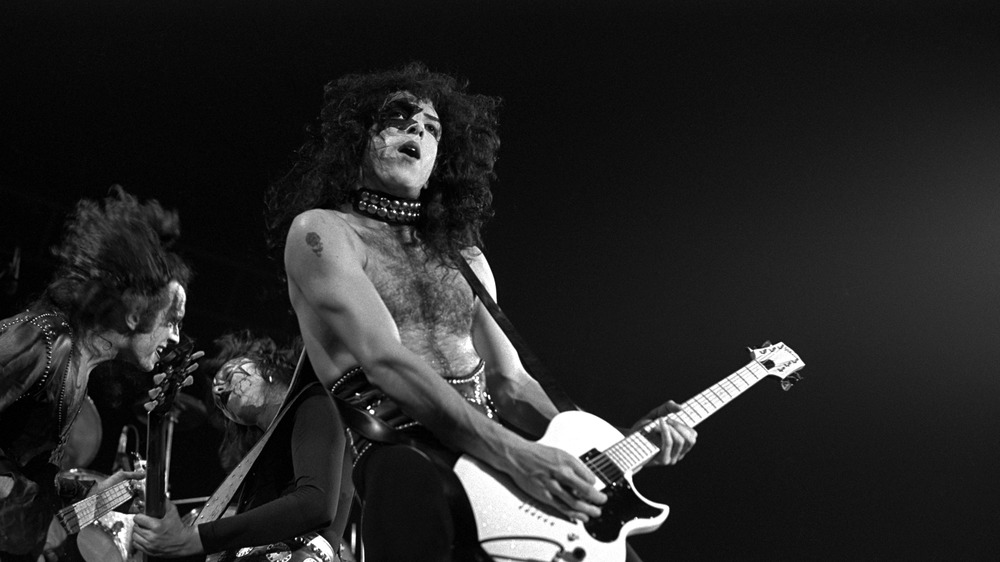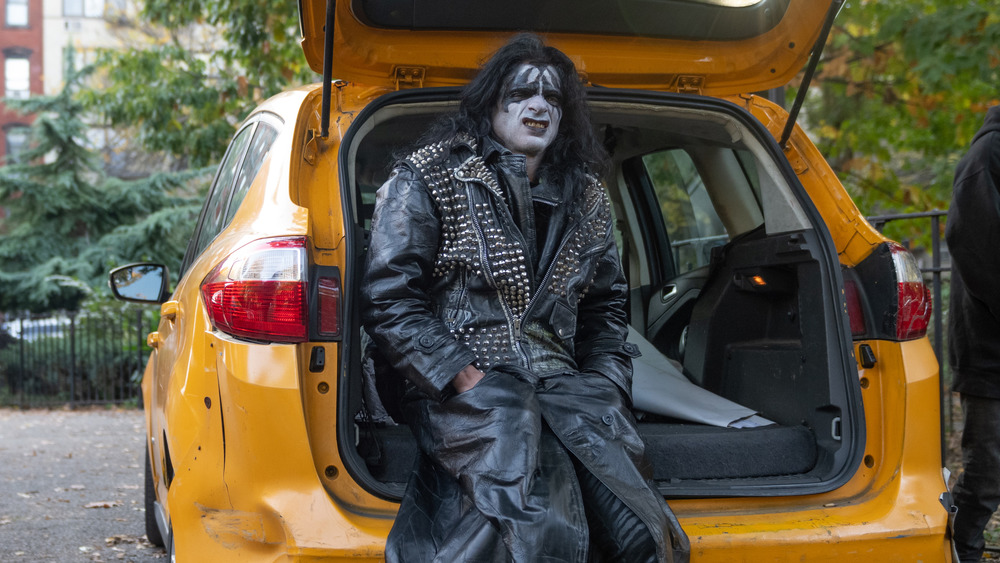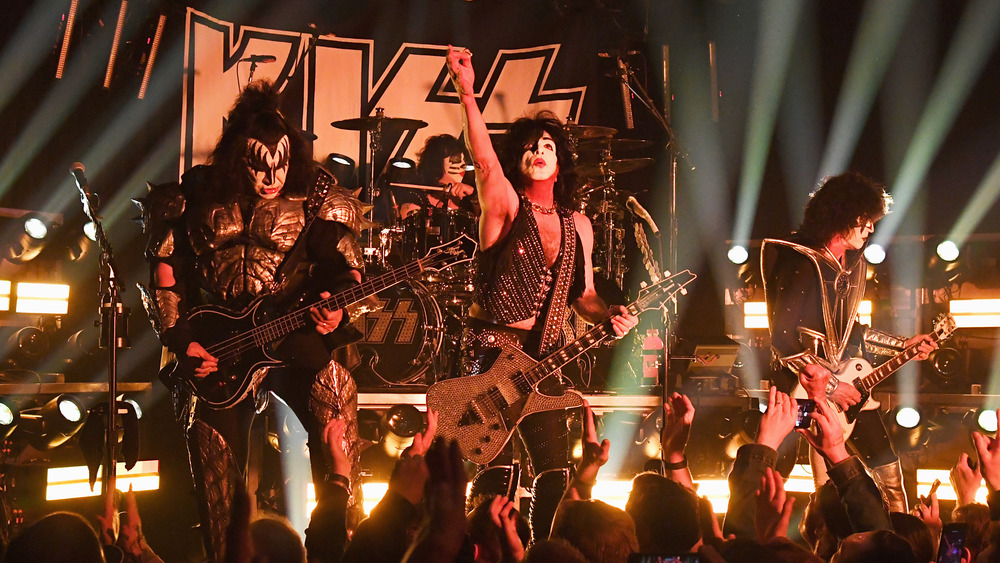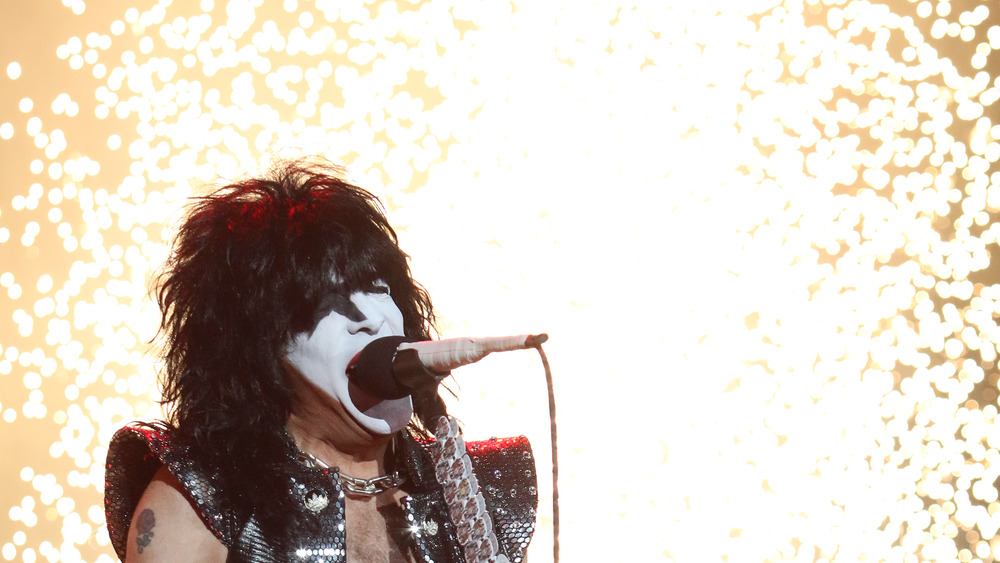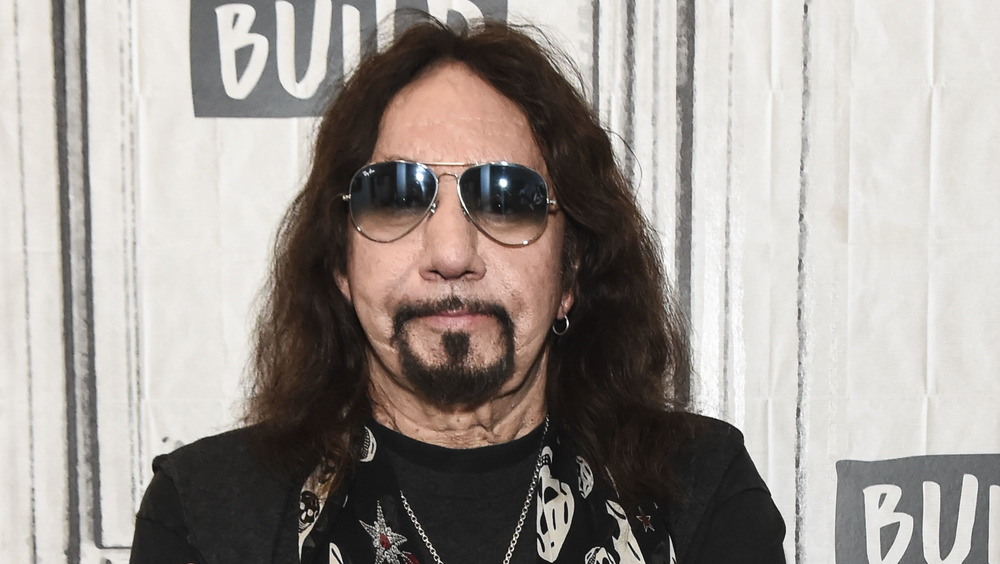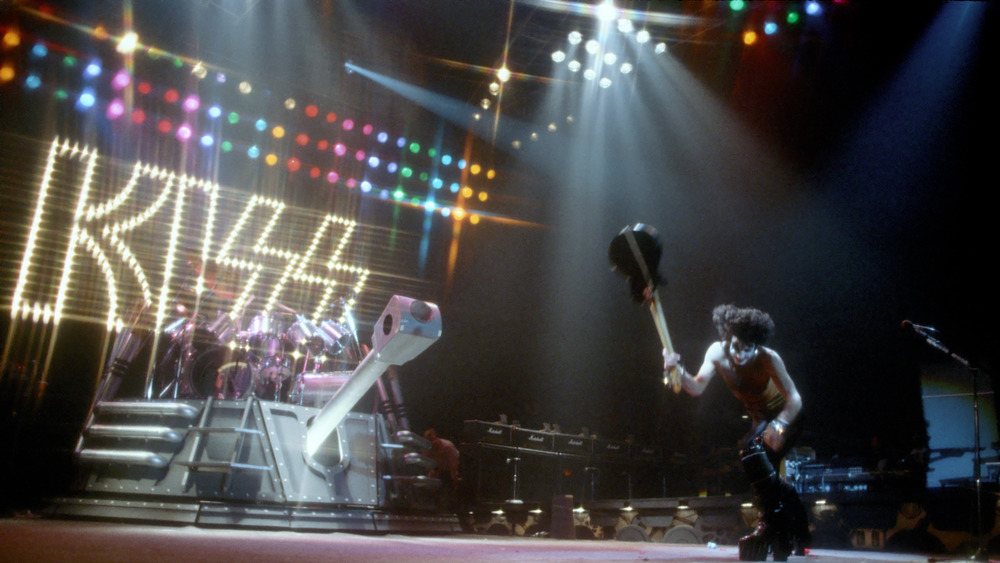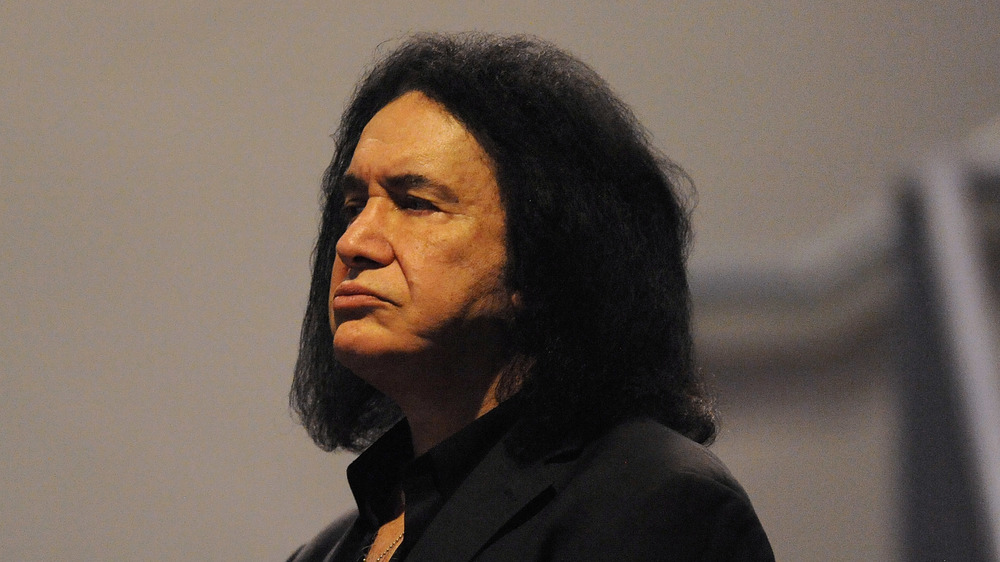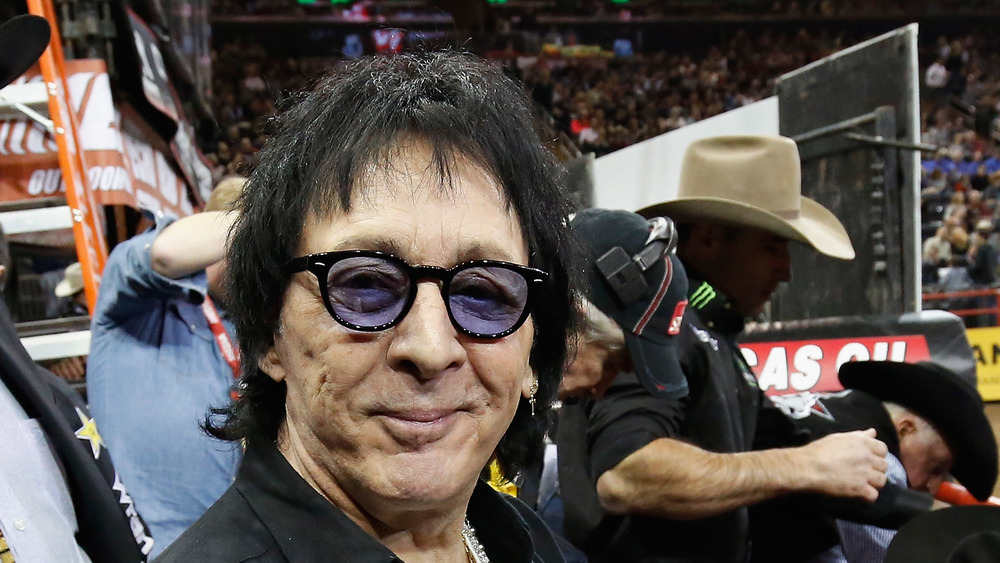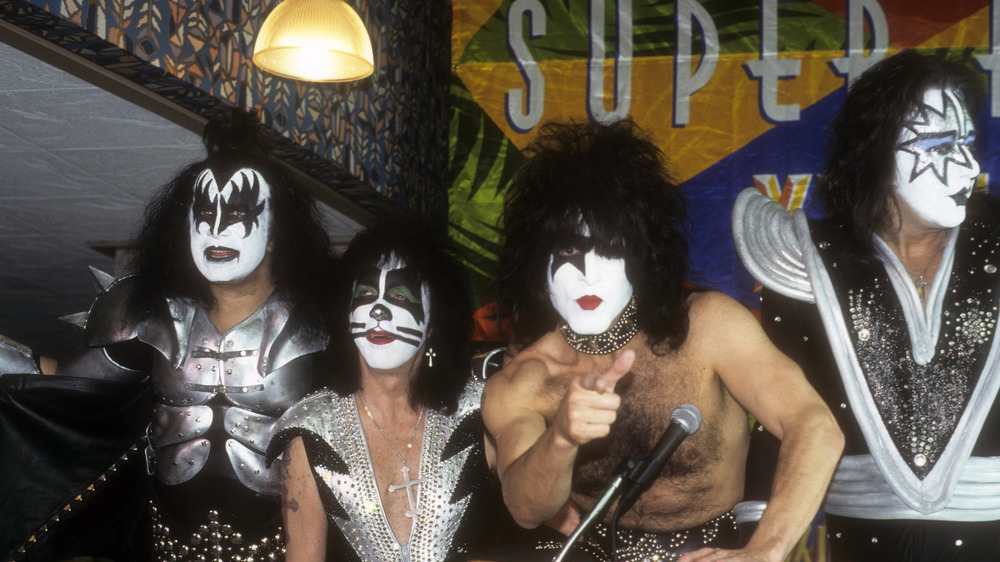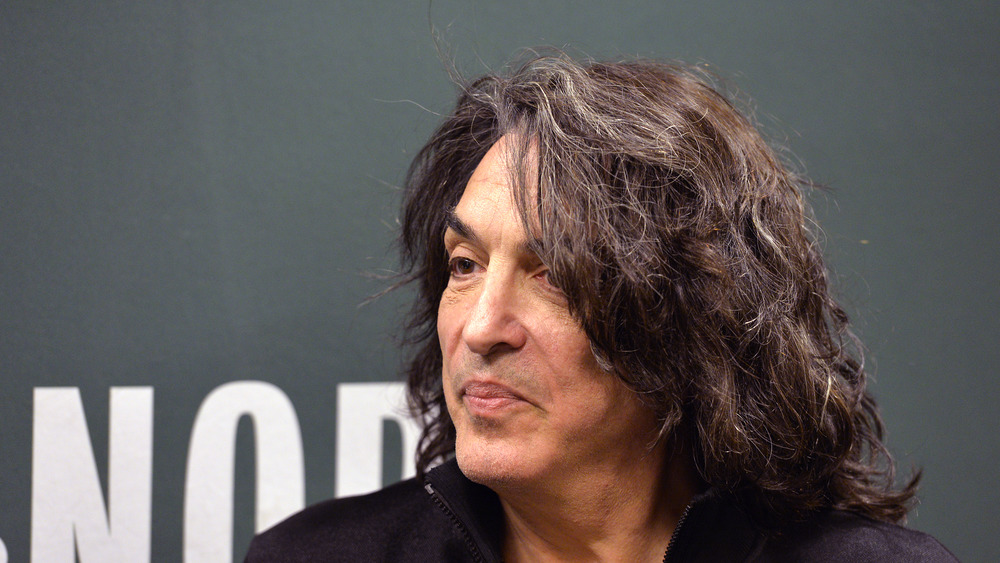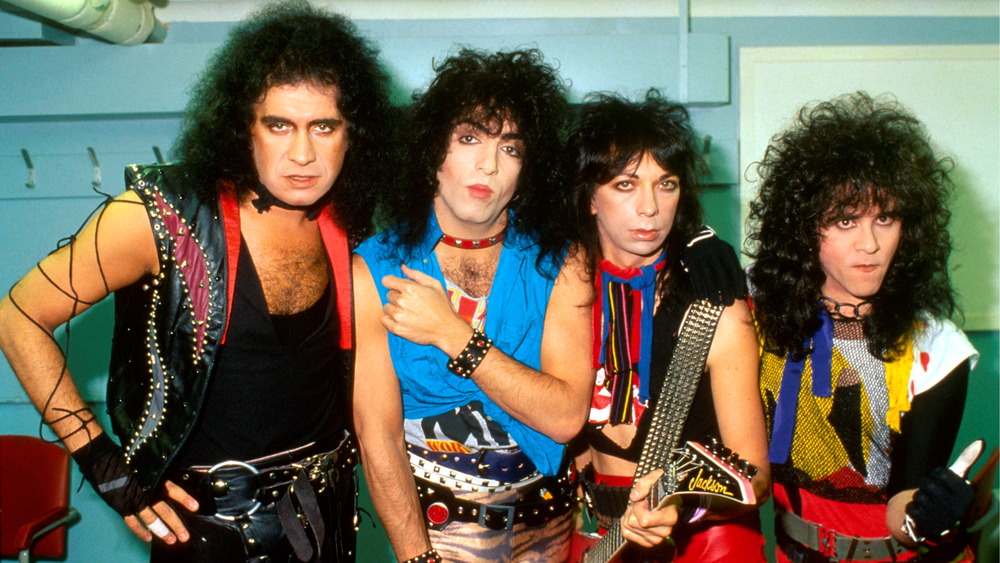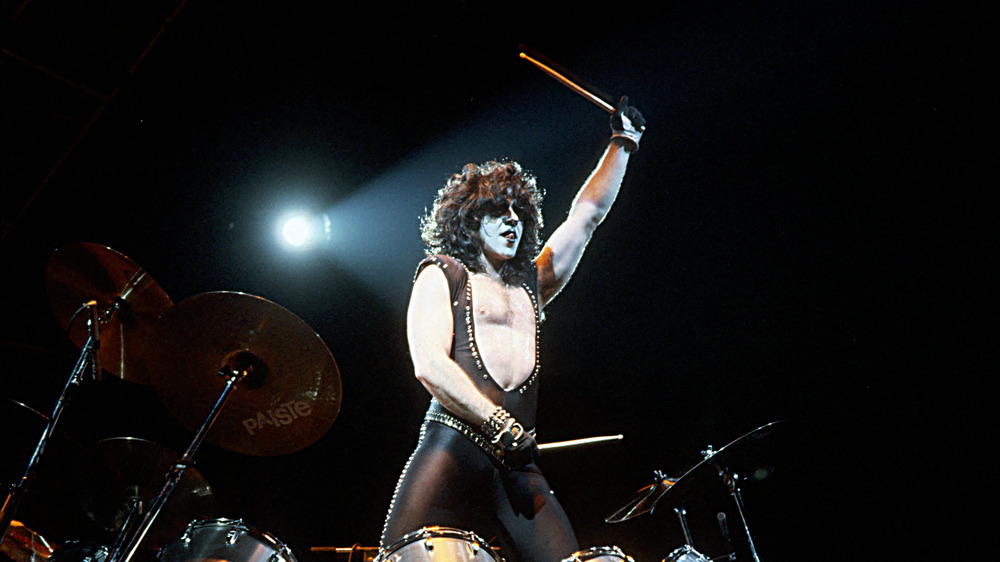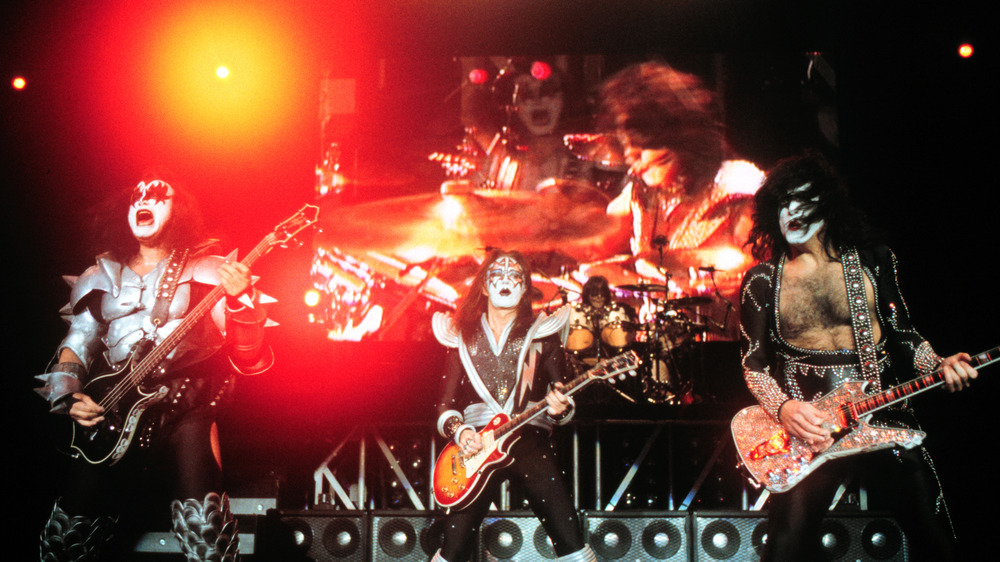The Tragic Real-Life Story Of KISS
KISS is among the most successful bands in the history of rock. Best known for its members' face paint and elaborate costumes, KISS formed in New York City in the early 70s and has become famous for its staggering live performances, which featured fireworks, blood-spitting, fire breathing, and smoking guitars.
Coming onstage dressed as fantasy characters, KISS made history for being something people had never seen before. With their contagious youthful energy and powerful electric vibes, they conquered teenage rock, releasing gold and platinum-winning albums. The band went through several breakups, with the departure of guitarist Ace Frehely and drummer Peter Criss in the 80s who, together with vocalists Gene Simmons and Paul Stanley, made up the original line-up of the band. In the 1990s, KISS reunited once again and went on a worldwide tour. In 2014, KISS was finally inducted into the Rock and Roll Hall of Fame. But despite their achievements and success in the music industry, things didn't always go well. Here's a look at the tragic real-life story of KISS.
All the members of KISS had a rough childhood
All the members of KISS had a rough start in life. Before he moved to the United States with his mother at the age of 8, Israel-born Gene Simmons grew up in poverty, surviving on rationed bread and milk, he recalled in an interview with Haaretz. Ace Frehley was expelled from two high schools for cutting classes and left a third in the Bronx. He was also in a gang. In an interview with Loudwire, Frehley discussed how music saved his life. "It definitely got me away from a negative element," he said.
Paul Stanley was born with a congenital ear problem called microtia. He was basically born without an ear, and he was severely bullied in school because of his disability, reports HuffPost. Peter Criss went to Catholic school in Brooklyn, where he suffered severe punishment by the nuns, including having his knuckles cracked until they bled, as he later recalled in his 2012 autobiography Makeup to Breakup: My Life in and out of Kiss. He would also get punished and locked in the closet for wearing his hair too long.
The first time KISS played there was nobody there
When KISS came onstage at the Popcorn Club in Queens on Jan. 30, 1973, there were less than ten people in the audience. According to Ultimate Classic Rock, shortly before the show, their manager quit, saying their music was "the worst crap he ever heard." But that didn't discourage Gene Simmons, who cold called the Popcorn Club himself, convincing the manager to let them play again for a trio of shows.
At the time, their signature look was not quite there yet. But from those early shots one can already catch a glimpse of the black leather and greasy make-up, as they played in front of a wall of fake amplifiers (a theatrical trick they used to make music seem louder). The idea was to "put together the band we never saw onstage," noted Simmons in a post on the band's website. That night they made only $50. A humble start for the foursome who was to become one of the best-selling bands of all time.
KISS almost lost their record contract
The band's first years were far from glamorous. In 1973, after playing their first shows in New York City, KISS hired Bill Aucoin as their manager, and they were the first band to be signed to Neil Bogart's newly established Casablanca Records. But KISS' first releases weren't doing too well commercially. Their brash and spectacular live performances had gained them a reputation, but aside from being a somewhat cult attraction, KISS remained fairly unknown.
According to Rolling Stone, the reviews were often trashing, and the three full-scale tours they'd embarked on left them and their label Casablanca Records deep in debt and without resources. "There were moments of doubt for me that we were gonna make it," Gene Simmons later recalled in the End of the Road World Tour program. During this time, Casablanca Records almost went bankrupt, and Kiss risked losing their contract.
In 1975, money was so tight that Bill Aucoin went as far as paying for the band's tour with his American Express card, LA Times reports. They really needed a breakthrough to keep afloat. Then in September of 1975, Kiss' album Alive! was released, skyrocketing them to fame pretty much overnight. The record, which featured some of KISS' best known tracks, including "Rock and Roll All Nite," "Deuce," and "Parasite," went platinum and became a hit, remaining on the charts for 110 weeks, per Classic Rockers.
Ace Frehley was almost electrocuted on stage
KISS was famous for their flamboyant, over-the-top theatrical stunts in the 70s. But a couple of times, those stunts got out of hand. In 1976, Ace Frehley nearly got killed during a gig in Florida. As the band came down to the stage, he took a hold of a metal rail to balance himself and was seized by the electric current, which made a circuit with his guitar. Thankfully he was able to let go before he got seriously hurt. "I got electrocuted in Florida and I survived," Frehley recalled to Rolling Stone (via Ultimate Classic Rock). He took a break and shortly after came back on stage to finish the night's set and was met with a standing ovation. The accident later became the inspiration for the song "Shock Me," the first track he ever sang on a KISS album.
Before Frehley's accident, in 1973, during a New Year's Eve show at the Academy of Music in New York City, KISS was an opening act for Blue Öyster Cult. Gene Simmons accidentally set his hair on fire during his fire-breathing theatrics, sending a member of the audience to the emergency room with burns on his head and face, Dangerous Minds reports.
KISS members were called Nazis because of their logo
During their first overseas tour in 1976, KISS' members were accused of anti-semitism in Germany and other European countries because of their logo. The letters "SS," which were bolted in their original moniker, were too similar to the insignia of the Nazi Party's paramilitary Schutzstaffel squad. The logo was banned in Germany, where the use of symbols and imagery associated with the Nazis is illegal and is subject to fines or even imprisonment, according to Ultimate Classic Rock. But KISS members have always denied the allegations.
Ace Frehley, who designed the logo by hand, said that when he drew it he was thinking of lightning bolts. "I want to go on record saying that I don't believe in Hitler or his ideology or anything he stood for," said Frehley in an interview with MTV. He said that the logo "wasn't modeled after Hitler or Nazis. It was just cool lightning bolts."
KISS' logo was ultimately banned in Germany after the overseas tour. "It was the most ridiculous thing," said Gene Simmons in KISS: Behind the Mask (via Ultimate Classic Rock). "KISS is 50 percent Jewish." Not only that, but Flora Klein, Simmons' mother, was detained in a concentration camp, and Paul Stanley's parents, also Jewish, fled Nazi Germany during the war, per Jewish Portland. KISS ended up changing their logo for all commercial purposes in Germany, flattening out the bolts to avoid fines and controversy.
Members of KISS were accused of being Satan worshippers
According to an FBI report, in 1980, a request was made to bureau offices in Texas regarding "civil unrest" at the band's concerts. While reports came back that nothing out of the ordinary documented. However, reports did reveal that a southern religious group in Arkansas was campaigning against the rock band, believing KISS stood for "Knights in Search of Satan" and that the members of the band were devil worshippers. The strange face paint, long tongues, and the fire-breathing antics probably played a big role in it, but the rumor originally started as a result of an interview Gene Simmons gave in Circus magazine after KISS' first album was released. "In response to a question, I said that I sometimes wondered what human flesh tastes like. I never wanted to really find out, but I was curious intellectually. Later on, this comment seemed to ignite the whole idea that in some way KISS was aligned with devil worship," Simmons wrote in his 2001 autobiography Kiss and Tell (via Snopes).
But, despite Simmons' bizarre statement, the band's name has nothing to do with the devil. "We just liked the name," said Simmons. "It was a simple word that people understood all over the world." But any press is good press, and while KISS denied any ties with Satanism, they also didn't do anything to discourage them. "It created an aura of mystery around us, and mystery sells," said Paul Stanley in Rock 'n' Roll Myths: The True Stories Behind the Most Infamous Legends. The irony is that Simmons was a theology major in school, and he was able to defend himself by quoting back the Bible to his religious critics, Cheat Sheet reports.
Peter Criss had a cocaine addiction
In the 70s, Peter Criss developed a cocaine habit. "Everyone surrounding my life did it — manager, lawyer, A&R guys, bodyguard, photographers," wrote Criss in his 2012 memoir, Makeup to Breakup (via nj.com). "I would be sitting across from a bunch of guys in suits who went to Harvard, doing blow." It wasn't until later that he realized the harsh consequences of addiction. "So, to me, it was cool...I figured, well, if lawyers were doing it and business managers and record presidents, that there [there] must be no downfall to this. And, sure enough, of course there is," said Criss. "It did put me in the nuthouse. For me, it was like mixing gasoline and fire," wrote Criss in Makeup to Breakup (via nj.com).
Criss fought hard to overcome addiction. "I realized I needed help," Criss said in an interview on Eddie's Trunk Show. In 1982 he went to rehab. Then a couple of years later he had a one-time relapse, but he has been sober since then, he allegedly stated in an email to a fan. Criss said that writing his book was cathartic and helped him to relieve himself from anger and his addiction to cocaine.
Peter Criss was fired from KISS
Peter Criss was fired from the band because of his drug addiction and wild behavior. According to Ultimate Classic Rock, on at least three occasions Criss deliberately sabotaged the band's shows during their 1979 tour. Things had been heavy among band members for a while. During a show on December 8, when Paul Stanley gestured to Criss to slow down the tempo in the middle of a song, Criss took it personally. "What that says to everybody in the arena is that I'm the one f***ing up the band," Criss wrote in his 2012 memoir, Makeup to Breakup (via Ultimate Classic Rock).
What happened next is that Criss intentionally "slowed the song down to a crawl" in the middle of the concert. That wasn't the end. Two nights later, during a concert in Jackson, Miss., Criss stopped playing for no reason during Stanley's solo performance. Criss didn't feel treated as an equal and had already expressed his desire to quit the band if things didn't change. On the other hand Stanley and Gene Simmons couldn't put up with him anymore. During a show in Biloxi, Miss., Criss hit Simmons on the back of the head with his drum stick and later threatened him with a broken champagne bottle in the dressing room, Live for Live Music reports. For Simmons and Stanley it was the final straw. In 1979 Criss was fired and replaced by new drummer Eric Carr.
KISS' breakup was nasty
After their initial success, KISS started to fall apart because of members' clashing personalities. The departure of Peter Criss only showed that the band had some deep internal issues, which were not going to be easily solved. According to Ultimate Classic Rock, Criss and Ace Frehely's hard life-styles didn't quite match Gene Simmons' and Paul Stanley's more sober work ethic. On the other hand, Frehely and Criss felt that they were being bossed around, and they thought Simmons and Stanley were too controlling.
After Criss left, things continued to deteriorate. "When tempers flared, I usually tried to be the peacemaker... with the loss of Peter, I soon realized things would never be the same," Frehley noted in his 2011 autobiography No Regrets (via I Love Classic Rock). After Criss left, it was a slow and painful dissolution. Frehley played his last show in 1980, but it wasn't until two years later in 1982 that he officially left the band. "I felt no connection to KISS anymore and wasn't happy about the direction the band was taking," recalls Frehley, per Ultimate Classic Rock. With Frehley and Criss gone, it was the end of the KISS original lineup.
Former member Vinnie Vincent sued KISS several times
Vinnie Vincent brought KISS back to fame in the 80s after replacing Ace Frehley. At the beginning, things seemed to be going smoothly. Vincent played lead guitar and co-wrote many of the songs on their subsequent albums. But when he consistently refused to sign a contract with KISS, keeping his employment unofficial, their relationship started to fall apart.
Vincent was asking for fairer wages. "There was nothing. I never saw any royalties during the time I was in the band; it was just a paycheck, that I took home 550 bucks a week," said Vincent in during an interview at an Atlanta KISS Expo (via Metal Wani). In 1984 KISS and Vincent split, and Vincent started what would become a 20-year-long lawsuit against his former bandmates over allegedly unpaid songwriting royalties. "It could have all been avoided. It was senseless, because there were millions of dollars in warranties," told Vincent. "We eventually settled everything that we had between us, all the problems. ... But I was in hell for 20 years, and it was my hell."
In spite of that, Vincent still holds a lot of respect for Gene Simmons and Paul Stanley. "The magic that we have together never dies," said Vincent, per Ultimate Classic Rock.
The tragic death of Eric Carr
In April 1991, drummer Eric Carr, who had replaced Peter Criss in the 80s, was diagnosed with heart cancer, an extremely rare disease. He underwent several surgeries, but by the time summer came his health had rapidly declined, making him unable to record the upcoming album, Revenge, with the rest of the band, per Rock and Roll Garage.
He died a few months later, on November 24, after suffering both an aneurysm and a brain hemorrhage. Sadly, it was the exact same day Freddy Mercury died, and Carr's death was largely ignored by mainstream media. Gene Simmons and Paul Stanley even wrote a letter to Rolling Stone, lamenting the lack of coverage and expressing their grief over the death of their friend and talented musician. "We loved him, the fans loved him and he will never be forgotten," wrote Carr's bandmates. To celebrate his legacy, in 2011 Carr's family released Unfinished Business, a collection of Carr's unreleased solo tracks.
KISS' 2000 Farewell Tour was a nightmare
"The tour was horrible. Constant Drudgery and misery," Paul Stanley wrote in his 2014 memoir, Face the Music: A Life Exposed (via Rolling Stone). After years of clashes and disagreement, in 2000 the band saw its original members reunited. But what was meant to be a glorious comeback turned out to be a nightmare. "We never knew if we'd make it to a show on time, and once we got onstage we never knew whether we'd get through the show," Stanley lamented. He was especially bitter at Ace Frehley and Peter Criss for finding excuses to skip rehearsals and for showing up at the very last minute.
In August of 2000 things got tense when Frehley missed every available flight to get to Irvine, where KISS was playing a show, Ultimate Classic Rock reports. He was supposed to get there the day before and ended up showing up right before the concert. Even though the tour did well commercially, the general mood ended up affecting the band's performance. "By the 'farewell' tour, I thought we were disappointing people. People may have loved the excitement and the novelty of seeing us again, but many nights we weren't very good," said Stanley during an interview on Talk is Jericho in 2014. "The 'farewell tour' was us wanting to put KISS out of its misery."
The last time all four original members of KISS performed together was the North Charleston, S.C., show in 2000, covered in Rolling Stone. The band, whose current lineup features Gene Simmons, Stanley, Tommy Thayer and Eric Singer, has announced its final concert will take place on July 17, 2021, in New York City, Ultimate Classic Rock Rock reports.
